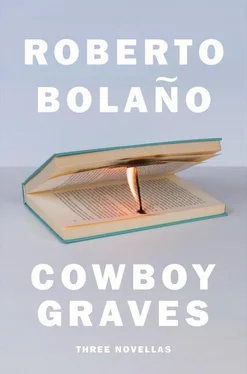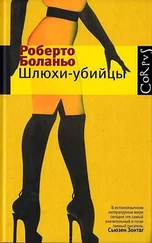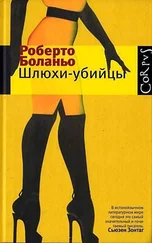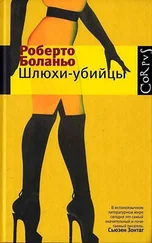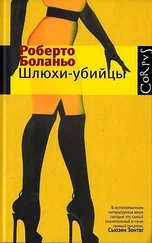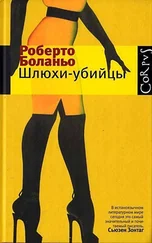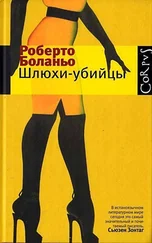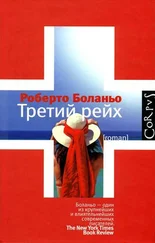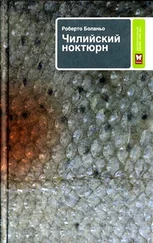One morning, as I was looking for a book in the Librería el Sótano, I saw that a scene from a film was being shot and I went over to investigate. I recognized Jacqueline Andere. It was the first time I’d seen one of my movie legends in person. When I went to the movies alone I would sit in the front row and cross my legs. With my left hand I rubbed my penis through my pants until I came. The only problem was syncing my orgasms with the best scenes in the movie, which wasn’t so hard when I was seeing something for the second or third time, but could be truly agonizing on a first viewing. When I saw Barbarella , for example, I came right away (during the striptease in the spaceship) and when I saw Crimenes pasionales with an actress of Jacqueline Andere’s generation—totally gorgeous, one of my favorites, though I’ve forgotten her name—I put off coming for so long that it finally happened as the credits were rolling. My assiduous moviegoing gave me so much practice that in the end I became an expert in inscrutable masturbation and motionless orgasms (face frozen, maybe just a drop of sweat rolling down my cheek); the movements of my left hand were so precise and economical that today it strikes me as incredible. But anyway, that morning I spotted Jacqueline Andere and I had the dumb idea to go and ask for her autograph. I don’t know why; I’d never been interested in autographs. So when she finished shooting her scene I went up to her (it was a surprise to discover how short she was, even in her stiletto heels) and asked if I could get her autograph. It was one of the simplest things I’ve ever done. Nobody stopped me, nobody came between Jacqueline and me, nobody asked what I was doing there. For a second I thought that I could have kidnapped Jacqueline. Just the prospect of it made my hair stand on end. In the scene, she was walking along a path in the Alameda. When she was done, she stopped for a moment, as if she’d heard something, though none of the crew had said anything to her, and then she walked on toward the Palacio de Bellas Artes, where years later I would give a disastrous poetry reading (disastrous because of what happened at it and after it), and all I had to do was walk toward her. When I reached her, I stopped. She looked me up and down, her blond hair an ashy color that I had never seen before (it might have been dyed), her eyes big, almond shaped, sweet—but no, sweet isn’t the word; calm, incredibly calm, as if she was drugged or had flatlined or was an alien—and she said something that I didn’t understand.
The pen, she said, the pen to sign with.
I found a pen in my jacket pocket and I had her sign the first page of Camus’s The Fall . Are you a student? she asked. Yes, I said. So why are you here instead of in class? She didn’t say it in an aggressive way and she wasn’t being sarcastic; she was just stating a fact. Sometimes I take the morning off, I said. Actually, I had been taking every morning off for months now, and I knew I wouldn’t be going back to class, though I preferred to postpone the reckoning, the moment when I would have to tell my parents. She asked my name. All right, then, let’s sign, she said. Then she smiled at me, shook my hand (her hand was small, delicate boned), and walked off across the Alameda alone. I stood there watching her. Two women approached her fifty yards farther along. They looked like missionary nuns, two Mexican missionary nuns in Africa, pausing there with Jacqueline under an ahuehuete, and then the three of them walked off toward Bellas Artes.
On the first page of The Fall , Jacqueline wrote: “For Arturo Belano, a liberated student, with a kiss from Jacqueline Andere.” When I read it I couldn’t help laughing. Suddenly I wasn’t in the mood for bookstores, long walks, reading, early shows (especially early shows). The prow of an enormous cloud appeared in the center of Mexico City, while to the north of the city the first thunder echoed and lightning split the sky. I realized suddenly that the filming had been cut short because it was about to rain. I felt lonely, and for a few seconds I was afraid and I wished frantically to be back home. Then the Grub waved to me. I suppose after all this time he had noticed me too. I turned and there he was, sitting on the same bench as always, distinct, absolutely real in his straw hat and white shirt. When the film crew left, I noted fearfully, it was as if the sea had parted. The empty Alameda was the ocean bottom and the Grub its most precious jewel. I greeted him, probably made some banal remark, and we headed out of the Alameda together into the neighborhood around the Blanquita Theater.
What happened next is hazy and at the same time sharp, hyperreal. The bar was called Las Camelias. I ordered enchiladas and a Tecate, the Grub a Coca-Cola, and later (but it couldn’t have been much later) he bought two turtle eggs from a street vendor. We talked about Jacqueline Andere. It wasn’t long before I realized, astounded, that he didn’t know she was an actress. I pointed out that she had been filming just now, but the Grub simply didn’t remember the crew or the equipment set up for the shoot. Then it stopped raining and the Grub pulled a wad of bills out of his back pocket, paid, and left.
The next day we saw each other again. By his expression, I thought that he didn’t recognize me or didn’t want to say hello. Still, I felt indebted to him and I went up to him. He seemed to be asleep with his eyes open. He was thin, but except for his arms and legs, his flesh looked soft, even flabby. His flaccidity was more moral than physical. His bones were small and strong. Soon I learned that he was from the North or he had lived in the North for a long time, which is essentially the same thing. I’m from Sonora, he said. I thought that was funny, since my grandfather was from there too. This interested the Grub, and he wanted to know what part of Sonora. Santa Teresa, I said. I’m from Villaviciosa, said the Grub. One night I asked my father if he had heard of Villaviciosa. Of course I’ve heard of it, said my father, it’s a few miles from Santa Teresa. I asked him to describe it to me. It’s a very small town, my father said, the population can’t be over a thousand (later I learned that it wasn’t even five hundred), the people are poor, no way to make a living, not a single industry. It’s fated to disappear, said my father. Disappear how? I asked. Emigration, said my father, people leaving for cities like Santa Teresa or Hermosillo or heading to the United States. When I told the Grub this, he didn’t agree, though in reality words like agree or disagree meant nothing to him: the Grub never argued about anything, nor did he express opinions. He was no model of respect for others. He listened and registered information, or maybe he just listened and then forgot, trapped in a different orbit. His voice was soft and monotonous though sometimes it rose in pitch and then he seemed like a lunatic imitating a lunatic and I never knew whether he did it on purpose, as part of a game that only he understood, or whether he just couldn’t help himself and those shrill moments were part of the hell he was living. He ascribed his confidence in Villaviciosa to the town’s longevity, and also (though I realized this later) to the precariousness that engulfed it and ate away at it—the very thing that threatened its existence, according to my father. He wasn’t a curious person, though few things got past him. Once he looked at the books I had with me, one by one, as if reading was a chore. Then he never showed any interest in my books again, though each morning I appeared with a new one. Occasionally—maybe because he considered me a fellow countryman somehow—we talked about Sonora, which I hardly knew: I had been there only once, for my grandfather’s funeral. He named towns like Nacozari, Bacoache, Fronteras, Villa Hidalgo, Bacerac, Bavispe, Agua Prieta, Naco, which gleamed like gold in my mind. He named lost villages in the municipalities of Nácori Chico and Bacadéhuachi, near the border with the state of Chihuahua, and then—I don’t know why—he covered his mouth, like someone about to sneeze or yawn. He seemed to have walked and slept in every mountain range: Las Palomas and La Cieneguita, Sierra Guijas and Sierra La Madera, Sierra San Antonio and Sierra Cibuta, Sierra Tumacacori and Sierra Sierrita (well over the Arizona border), Sierra Cuevas and Sierra Ochitahueca to the northeast near Chihuahua, Sierra La Pola and Sierra Las Tablas to the south on the way to Sinaloa, Sierra La Gloria and Sierra El Pinacate to the northeast, in the direction of Baja California. He had been all over Sonora, from Huatabampo and Empalme on the Gulf of California, to the lost hamlets in the desert or the mountains, near Arizona. He could speak Yaqui and Papago (which flowed freely in Sonora and Arizona) and he could understand Seri, Pima, Mayo, and English. His Spanish was flat, sometimes with a faint put-on air belied by his eyes.
Читать дальше
